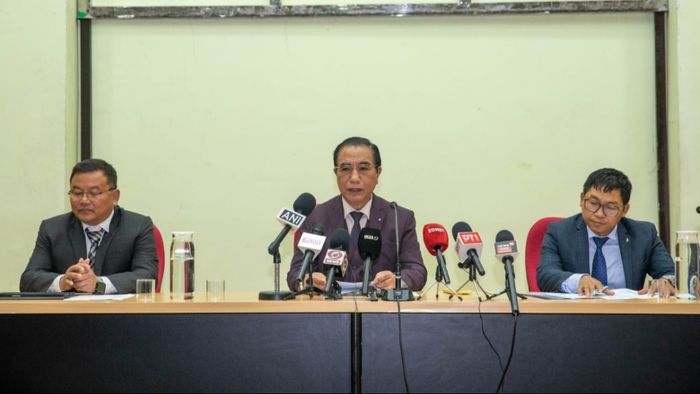Mizoram CM Lalduhoma announces over Rs 13 crore maiden budget, introduces "Kalphung Thar – Mipui Sawrkar"
Mizoram Chief Minister Lalduhoma presented his maiden budget today at the 9th Mizoram Legislative Assembly.

- Feb 27, 2024,
- Updated Feb 27, 2024, 3:06 PM IST
Mizoram Chief Minister Lalduhoma presented his maiden budget today at the 9th Mizoram Legislative Assembly.
This marks the budget prepared by the new Zoram People’s Movement (ZPM) government following their assumption of power.
The total value of the state budget estimate for 2024-25 (exclusive of Charged Expenditure) is Rs 13,176.85 crore, with a Supplementary Demand (Voted Expenditure) for 2023-24 amounting to Rs 3,287.93 crore.
According to Chief Minister Lalduhoma, 2024-25 is expected to be the year of consolidation. The new government's goal is to reduce the fiscal deficit and decrease the high debt as much as possible. He also stated that the government will refrain from undertaking large-scale projects using state funds that require significant counterpart funding during this fiscal year.
The new government of Mizoram has unveiled its budget plan for the upcoming fiscal year, focusing on consolidating financial stability and implementing socio-economic reforms.
Also Read: Mizoram Budget for 2024-25: CM's 100 days programme launched, set goals for progress by March 31, 2024
Key initiatives include the introduction of a new governance system, "Kalphung Thar – Mipui Sawrkar," and the implementation of the Chief Minister's 100 Days Programme. Efforts will be made to reduce fiscal deficits, curb debt accumulation, and promote balanced economic growth with environmental protection and social equity. The government aims to empower various sectors through initiatives like the Hand Holding Policy and procurement of key cash crops at remunerative prices. Measures will also be taken to strengthen social security, extend welfare services, and improve power generation and supply. Additionally, the budget includes allocations for education reforms, infrastructure development, and disaster management. Despite fiscal constraints, the government is committed to enhancing capital expenses and ensuring efficient use of public resources.
Gross State Domestic Product (GSDP) - Rs. 48037.52 crore
Receipts / Expenditure - Rs. 14412.12 crore
Revenue Expenditure - Rs. 11957.04 crore
Capital Expenditure - Rs. 2455.08 crore
Here are some of the key features in the new budget -
In light of precarious financial circumstances, the government aims to declare the upcoming year as a "Year of Consolidation'' and introduce a new governance model, "Kalphung Thar – Mipui Sawrkar," to address socio-economic reforms. Key objectives include mobilizing financial resources, promoting economic growth while ensuring environmental protection and social equity, and implementing reforms across various sectors. Additionally, efforts will target combating corruption, enhancing social security measures, environmental conservation, and fostering entrepreneurship and skill development. The initiation of the Chief Minister's 100 Days Programme, overseen by a monitoring committee with a set completion deadline of March 31, 2024, underscores the government's commitment to prompt action.
In the fiscal year 2024-25, the government's focus is on consolidating the state's financial health by reducing fiscal deficits and curbing debt accumulation through prudent financial management, starting with curtailing extravagant spending. This entails a projected reduction in public debt by ₹697.69 crore, with significant capital projects excluded from the budget. Moreover, plans include procuring four key cash crops from producers at remunerative prices while allowing them to sell at higher rates.
The flagship "Bana Kaih" or Hand Holding Policy aims to empower various sectors, including uplifting farmers, promoting entrepreneurship and skill development, creating youth employment opportunities, and supporting small-scale and agro-based industries. It seeks convergence with central government schemes to benefit common people, especially those in agriculture and industry. The government plans to allocate ₹200.00 crore for 2024-25 under this policy, along with a corpus fund of ₹110 crore for the Agricultural Market Assurance Fund.
To ensure effective implementation of government projects and policies, two committees have been established: the Mizoram Project Monitoring Committee and the Mizoram State Policy Coordination Committee. These bodies oversee project quality, efficiency, timely completion, and policy matters, respectively. Additionally, they evaluate handholding project proposals to enhance efficiency and prevent duplication.
In the upcoming fiscal year, initiatives include providing free mortuary van services, allocating ₹5.00 crore for this purpose, and setting aside ₹20.00 crore for healthcare financing, complementing previous allocations. The government also pledges to refrain from raising power bills during its tenure, focusing instead on alternative revenue enhancement strategies and improving power supply.
Plans for the next fiscal year include allocating funds for improving power generation and supply, upgrading infrastructure, and strengthening social security. Moreover, contributions to the Indira Gandhi National Old Age Pension Scheme will increase, and significant allocations will be made to Autonomous District Councils. Measures to promote gender equality include introducing a Gender Budget Statement for the first time.
The Fifteenth Finance Commission has recommended a 41% share for states in the divisible pool of taxes, with Mizoram receiving 0.5%. Urban and Rural Local Body Grants are also expected to increase, along with allocations for disaster response and mitigation. Capital Expenditure is earmarked at ₹2455.08 crore, although fiscal constraints may limit the state's ability to meet all obligations solely from revenue sources. Additionally, Supplementary Demands for Grants totaling ₹3294.16 crore are required under Revised Estimates, necessitated by late fund releases under various schemes.